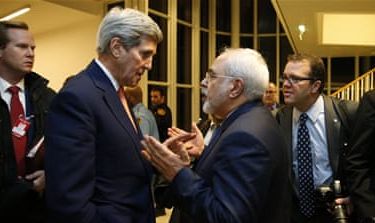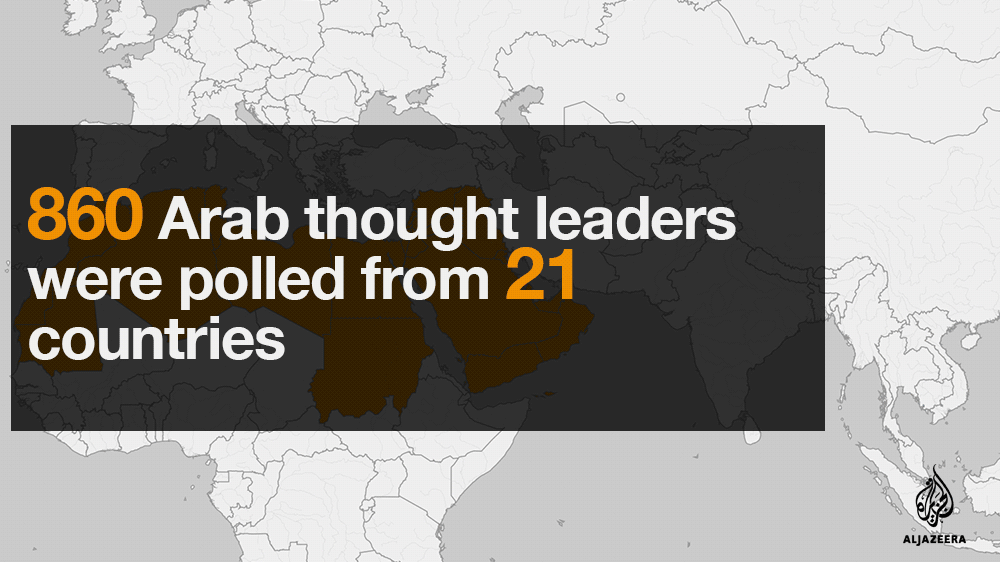Cynicism dominates Arab thought leaders’ views of Iran
Al Jazeera discusses the findings with Fatima Alsmadi, an Iran specialist who conducted the poll.

A poll of Arab opinion formers has found that 90 percent believe that relations between Iran and Arab countries are worse than they should be.
| Other poll findings |
|
48 percent : Expect worsening relations between Iran and Arab countries over the next five years 85 percent : Object to foreign military intervention to confront Iran 88 percent : Strongly agree or agree that the Palestinian issue is used by Iran to increase its influence in the region, but 90 percent strongly agree or agree that this is due to Arab institutions’ failures in supporting Palestinians 60 percent : Both Iranian and Arab religious scholars play a negative role in increasing tension in Arab-Iranian relations 75 percent : There should be more cultural ties between Iran and Arab countries |
According to the poll, released on Monday by the Al Jazeera Centre for Studies, 69 percent of those questioned support the establishment of a cooperative regional security order between Iran and the Gulf Cooperation Council (GCC) countries, including Saudi Arabia, the UAE, Qatar, Oman, Kuwait and Bahrain.
According to the Studies Centre, “The opinion poll was conducted to better understand how Arab thought leaders, including politicians, policymakers, thinkers, academics and activists, view their region’s relations with Iran overall, and where they believe these relations are headed.”
While the poll indicates that 81 percent of those interviewed by telephone from 21 Arab countries believe that there should be better relations between Iran and Arab countries, only 58 percent believed that Iran and only 35 percent believed that Arab countries were serious about improving relations with each other.
The poll found an even split among those who view the warming of relations between Iran and the United States positively (44 percent) and those who view it negatively (45 percent).
Al Jazeera spoke to Fatima Alsmadi, the Studies Centre’s Iran specialist who conducted the poll, about its findings and recent developments in the region.
Al Jazeera: What are the criteria on which this poll was conducted? How did you determine who was an Arab thought leader?
Fatima Alsmadi: Although the polling was actually conducted between September 30 and November 30, 2015, we began preparing for it in March 2015. In the beginning, we worked on identifying who the key people were in 21 different Arab countries.
We did this by reaching out to our Al Jazeera bureaus across the region, as well as specialists – such as journalists, analysts, and others on the ground – and putting together a list of the most influential opinion makers in these countries.
We focused on people working in politics, economics, academia, and those doing social work. And in some countries, such as Iraq and Yemen, we even made sure to identify key tribal leaders who hold a great deal of influence.

Al Jazeera: This poll comes across as lumping the “Arab world” into a monolith, at the risk of not accurately reflecting the various and competing political views prevalent across the region.
Alsmadi: It is true that the findings released in this study deal with wider, more general issues.
But during our polling, we also focused on specific issues relevant to a particular country. While we asked about the political environment in general across the Arab world, we asked each respondent about specific issues they are facing in their respective country.
We will eventually make some of those findings public, such as what some Iraqi opinion makers think of Iranian policy in Iraq, what Palestinians think about Iran’s role in the Palestinian issue, and so on.
However, we have noticed a pattern among many of our respondents across the region regarding their views on more general issues with regards to Iranian policy towards the Arab world.
We also asked open-ended questions, where we gave respondents the opportunity to answer however they pleased. These questions were asked with regards to specific issues such as Iran’s role in the Syrian civil war, the nuclear deal, and so on.
Al Jazeera: You chose to focus on Iran’s image across Arab countries for this poll. Do you have any plans on doing polls about other regional powers, such as Israel, Saudi Arabia, or Turkey?
Alsmadi: This is just the first step in a series of polls we hope to conduct. We chose Iran first because Iran is a country that the Al Jazeera Centre for Studies has specialised in. Much of our research has been done on the political role it plays in the Arab world.
We do have plans to do one on Turkey, Israel, and other places.
For now, however, Iran is clearly on the mind of many Arab thought leaders, and their policies are particularly sensitive to many Arabs given the role the country has played in Syria, Iraq, Yemen, and even Palestine – an issue near and dear to many Arabs.
We also often talk in terms of the Saudi-Iranian relationship due to the impact it has on the region in general. There is no single [political] issue in the Arab world that does not involve Iran as a player.
Al Jazeera: What do you think of the ongoing Saudi-Iranian dispute and the increase of sectarianism in the region?
Alsmadi: This conflict is political in nature and is shaped by regional dynamics. But surely it has taken on other tones, which have been a result of this political dispute.
The political factors are what created the sectarian tension, and not the other way around. The continuation of political conflicts has led to sectarianism; the lack of a solution to the Syria crisis, the conflict in Iraq, and so on.
Nearly 80 percent of our respondents said that these conflicts would affect sectarian tension in these places.
Iran says that its foreign policy is not built on sectarian motives. We know it has a close relationship with groups like Hamas and others that are not Shia Muslim groups, for political reasons.
But it’s also true that they do consider the protection of the Shia Muslim community in the world to be a major issue for them. We can’t say that their role in Iraq is not sectarian-based – not in rhetoric, perhaps, but certainly it is in practice.